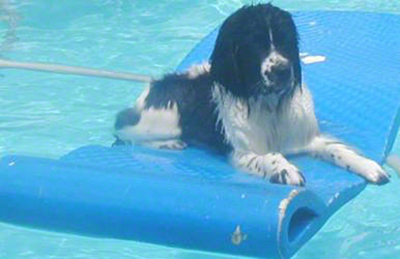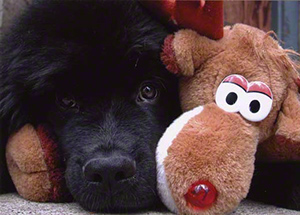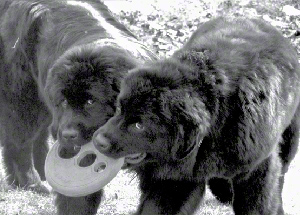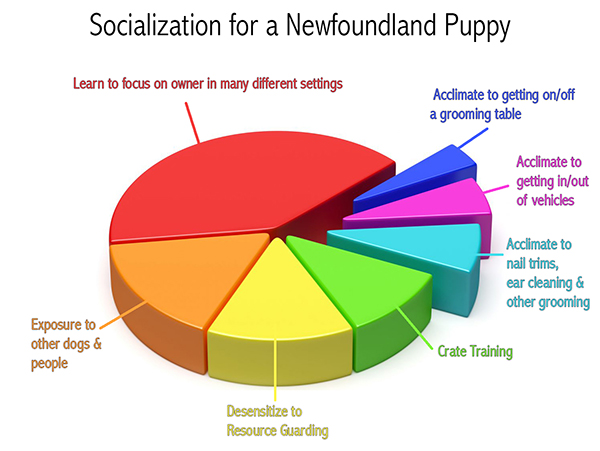
Your Newf can learn to be a welcome and well-respected member of the community Here's a comprehensive guide to puppy socialization.
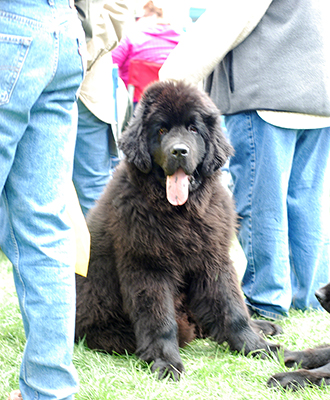
Socializing Your Dog
The first sensitive period of socialization for puppies is between 4 and 12 weeks of age. Ideally, your breeder will have already introduced your puppy to a variety of sights, sounds, and experiences during this crucial phase. However, between 12 weeks and six months, known as the juvenile period, puppies begin to develop fears, making socialization especially important. This is the time to expose your puppy to new experiences, people, animals, and environments in a positive way. After six months, introducing new concepts becomes much more challenging.
Below is a comprehensive list of socialization experiences your puppy should have to grow into a well-adjusted adult dog. Always ensure your puppy remains relaxed and comfortable, rewarding them with treats and praise to reinforce positive associations.
Socializing Your Newfoundland Puppy With People
Your puppy should meet people of all ages, sizes, shapes, and ethnicities, including:
• Infants, toddlers, children, teenagers, adults, and seniors – Dogs need to be comfortable around people at all life stages.
• Men and women – Some dogs may develop preferences, so equal exposure is beneficial.
• People with different skin tones, facial hair, and hairstyles – This helps prevent fear-based reactions.
• People using assistive devices – Ensure your pup is familiar with wheelchairs, walkers, crutches, canes, and hearing aids.
• People in uniforms and costumes – Introduce your pup to police officers, firefighters, delivery drivers, postal workers, and people wearing hats, sunglasses, or masks.
• People engaged in different activities – Running, cycling, dancing, carrying objects, playing instruments, or talking loudly.
It is important to note that introduction does not always mean interaction. Your puppy doesn’t need to be handled by every new person they meet. The goal is for them to remain calm and attentive to you while in the presence of new people. Reward them for being relaxed and focused on you.
Introducing Your Newf to Vehicles
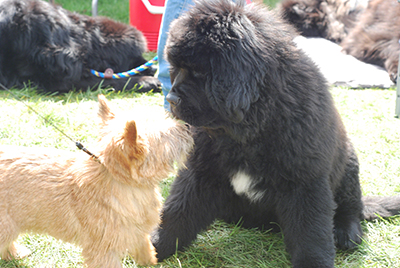
Your puppy should be exposed to various vehicles in a calm, controlled manner. This includes:
• Riding in your own car – Teach proper entry, exit, and car behavior. Start with short, pleasant trips.
• Observing moving vehicles – Get your puppy accustomed to motorcycles, buses, garbage trucks, emergency vehicles, bicycles, skateboards, and strollers.
• Hearing vehicle sounds – Engine revs, sirens, horns, car doors, and backup beeps should be introduced gradually.
• Experiencing public transportation (if applicable) – If you live in a city, exposure to buses, trains, and subways can be beneficial.
Some dogs may initially be nervous around large, noisy vehicles. If your puppy shows hesitation, create distance and reward calm behavior before gradually decreasing the distance over multiple exposures.
If your pup is hesitant about entering the car, spend a couple of days feeding meals in the car with the doors open to establish it as a fun, rewarding place to be.
Socializing With Other Animals
Encouraging positive interactions with other animals is an essential part of your puppy’s development. While dogs will naturally encounter other canines, they may also come across various species in their daily lives. Consider the following:
• Other dogs – Enroll in a puppy socialization class and introduce your pup to friendly, well-behaved adult dogs under controlled conditions.
• Cats – If you have or anticipate having a cat, start early. Keep interactions safe and positive.
• Horses and livestock – Some environments include farm animals, which can be intimidating to unexposed dogs. Supervised visits can help prevent fear.
• Birds and small animals – Teach calm behavior around squirrels, rabbits, ducks, and pet birds. Keep encounters controlled and never allow chasing.
• Wildlife – From a safe distance, allow your puppy to observe deer, raccoons, or other wildlife they might encounter.
Always ensure your puppy is on a leash or in a controlled environment when meeting other animals. Reward calm behavior and redirect any overexcitement or fear.
Socializing in Different Environments
Your puppy should become comfortable in a wide range of environments, both natural and man-made. Expose them to:
• Urban areas – Busy streets, sidewalks, and crowded places like farmers’ markets.
• Rural areas – Open fields, forests, bodies of water, and trails.
• Different flooring – Grass, sand, gravel, asphalt, tile, carpet, stairs (solid and grated), bridges, and metal surfaces.
• Public places – Parks, shopping centers, pet-friendly stores, outdoor cafés, and veterinary clinics.
• Grooming and hygiene experiences – Introduce the bathtub, nail clippers, ear cleaning, and brushing from an early age.
Be mindful of sensory experiences as well, including:
• Noises – Thunderstorms, fireworks, sirens, construction sounds, vacuums, and kitchen appliances.
• Smells – Cleaning products, perfumes, barbecues, and food aromas.
• Unfamiliar objects – Statues, fountains, balloons, and umbrellas.
For dogs destined for specific activities, such as therapy work or draft, exposure should be tailored accordingly. For example, Newfoundland dogs that may participate in cart pulling should be familiar with wheels, harnesses, and crowds.
Socialization Tips for Success
• Take it slow – If your puppy seems overwhelmed, retreat to a distance where they feel comfortable.
• Use positive reinforcement – Reward calm behavior with treats, praise, or play.
• Be consistent – Exposure should be frequent and ongoing, not just a one-time event.
• Control interactions – Avoid forcing interactions, and allow your puppy to observe before engaging.
• Monitor body language – Signs of stress include excessive yawning, lip licking, tucked tail, or avoidance. Adjust accordingly.
Preparing for the Future
If you plan for your Newfoundland to participate in parades, therapy work, or pulling a cart, ensure they experience the associated sounds, sights, and sensations early on. This could include exposure to marching bands, clapping crowds, and decorated floats.
Remember, proper socialization lays the foundation for a confident, well-mannered adult dog. By exposing your puppy to a variety of people, places, and experiences in a controlled, positive manner, you set them up for a lifetime of success.
Socialization is an ongoing process that continues throughout your dog's life. The more positive experiences your puppy has early on, the more adaptable and well-behaved they will be as adults. Take the time now to introduce them to the world, and you will be rewarded with a happy, confident companion for years to come.
